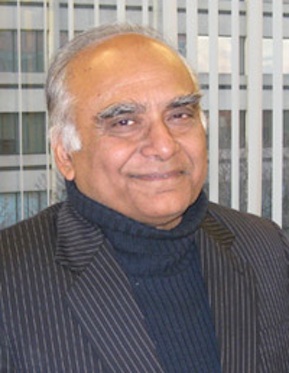BU Launches Exchange with India
Nation's top government health advisor visits Boston to plan partnerships

Nirmal K. Ganguly comes from a country grappling with a growing epidemic ofnoncommunicable diseases, a critical shortage of doctors in rural areas, and afledgling health-insurance system that covers only a small fraction of thepopulation. But when it comes to teaming up with Boston University on health research andeducational initiatives,India’s top governmenthealth advisor is adamant that a BU-India partnership should be a two-way street.
"Always when two organizations decide to work together,there’s a gain for both sides," Ganguly says. "We have strengths in certainareas — we want to use them to work on mutual objectives. We’d like it to beequal."
Ganguly, a senior advisor to India’s health minister andformer head of the Indian Council for Medical Research, India’s equivalent ofthe National Institutes of Health (NIH), recently spent two weeks as a DistinguishedVisiting Scholar at BU’s Global Health Initiative (GHI), based at the School ofPublic Health. In a series of meetings with faculty from both BU campuses, Ganguly worked overtime to brainstorm collaborations between BU affiliates and healthresearchers in his country and those at BU, assuring potential partners that he is open to all possibilities.
"Any projects you want to do," he says, "we will find a partner foryou."
The Indian Council for Medical Research and researchers from the BU Medical Center’s National Emerging Infectious Diseases Laboratories (NEIDL) have already started setting joint research goals, says GHI director GeraldKeusch, an SPH professor of international health and Medical Campus associateprovost for global health. Planning is under way for the SerumInstitute of India, a privately held pharmaceutical company that makes abouthalf of the vaccines that UNICEF distributes, to partner with NEIDL researcherson the development of new vaccines to treat emerging infectious diseases in Indiaand South Asia. Ganguly says that he foresees other partnerships with MedicalCampus researchers in the areas of dental medicine and genetic disorders suchas sickle-cell anemia.
The University is also working with MIT and the department of biotechnology in India’sMinistry of Science and Technology to develop a UNESCORegional Centerfor Education, Training, and Innovation, which will train Indian scientists to work inthat country’s biotechnology sector and to collaborate on projects that turnresearch findings into patient-care products.
Keusch and Ganguly say a key element of the BU-Indiapartnership will be faculty and student exchanges. More than 30 teachers from India’snewly opened public health schools have already come to BU for three weeks of training by SPH faculty and staff. The new schools, developed by the Indian Council forMedical Research and the Public Health Foundation of India, are training government physicians from disease-burdenedregions of India in public-health strategies. Ganguly says the new schools are a first step to creating aformal public health system, similar to the U.S.model.
"We turn out more doctors, nurses, and researchers than anyother part of the world, but we are also a huge country," Ganguly says. "Wehave not had a public health capacity, in the way that the United Statesdoes. Ultimately we are moving to that kind of system. The American system ismuch stronger and much more mature, and we are learning from it."
The new collaborations will expand on existing partnershipsbetween BU and India,which include research projects led by BU’s Center for International Health andDevelopment. Ganguly says he sees a number of intersections between BU’sscientific pursuits and those of India’shealth researchers.
"What is refreshing is that BU researchers are focusing oncertain areas that are relevant at the moment to the global community —emerging infectious diseases, global warming, environmental health, maternaland child health, and the development of diagnostics in health," he says."These are all areas of interest to us."
Ganguly’s visit to BU included meetings with David K. Campbell, University provost, Andrei Ruckenstein, vice president and associate provost for research, MarkKlempner, Medical Campus associate provost for research and NEIDL director, and Robert F. Meenan, SPH dean. He also toured the new biosafety level 4 NEIDL lab; Indiahas plans to open a level 4 lab in the next 18 months, he says.
Keusch, whose friendship with Ganguly spans the decade sincethey worked together on a project at the NIH, callsGanguly "a great liaison for us, institutionally."
"We already have alot of areas of common connection," Keusch says. "We’re trying to do somethingbig and systematic and engage the whole University with this exciting andinfluential nation called India."
Comments & Discussion
Boston University moderates comments to facilitate an informed, substantive, civil conversation. Abusive, profane, self-promotional, misleading, incoherent or off-topic comments will be rejected. Moderators are staffed during regular business hours (EST) and can only accept comments written in English. Statistics or facts must include a citation or a link to the citation.